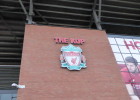We are in the midst of the worst public health crisis of my lifetime. Covid-19 is deadly, which is something I understand very clearly. Not only have I lost an old friend to the virus, but I live with the daily threat that it if I get it I’m likely to die of it. As someone with multiple sclerosis, I would already have been on the NHS’s list of people who should be shielded even before I had treatment for my MS in February. That treatment, which boasts the licensed name of Lemtrada and the medical title of Alemtuzumab, is a form of chemotherapy designed for leukaemia patients. It wiped out my immune system, so I would be unlikely to be able to fight off the Coronavirus if I were to catch it. I have come to the realisation that I’m not going to be able to mix freely with other people until there is a cure or a vaccine, meaning that I’ll be restricted to my own house for many months to come. I don’t need to be lectured about the seriousness of the situation.
A new week begins 💪
Stay safe, keep smiling and look after each other ❤️ pic.twitter.com/3K0peN4YQF
— Liverpool FC (at 🏠) (@LFC) May 4, 2020
It is ludicrous that any conversation about football has to be prefaced with the disclaimer that ‘I understand this is serious’. Thousands of people have died from the disease and by the time this is all over it’s likely to be millions. It goes without saying that anyone with half a brain cell is more than aware that Covid-19 should be treated with respect, fear and seriousness. Not one sensible person thinks that football should just get back underway tomorrow, be damned with the consequences. Everyone I know wants public health to be put at the forefront of any conversations had around the resumption of sport and if football can’t return as safely as possible then football can’t return. I’ve waited my entire adult life to see Liverpool win the Premier League, but I’d rather not see it happen than witness a single person’s life be put at risk in order to make it happen. I do want us to win it, though, and I won’t be made to feel guilty for that.
Football Matters To Many
Any mention of trying to resume football matches to someone that doesn’t love the game will immediately be met by cries of ‘it doesn’t matter’ or ‘it’s unimportant’. Obviously I have some sympathy with this point of view. Compared to those working hard to keep people alive day-in, day-out in hospitals up and don’t the country, football really isn’t even remotely important. Yet, there is something that football offers that people really need right now. Partly that is a distraction, giving everyone something other than this horrendous disease to think about. Partly it is the promise of a return to normality at some point further down the line. It will mean different things to different people, but you can’t tell me that it doesn’t mean anything. There will be doctors and nurses all across the world whose minds will turn to football every now and then because it meant so much to them before all of this took hold of all of our lives.
I miss the footy so much. For a good few hours you could just take your mind off everything bad and focus on that. You don’t realise how important things are until they’re not there anymore.
— Sarah (@sarahpatta_) May 4, 2020
As a Liverpool supporter I’m obviously invested in the return of football because I’d like to see the Reds lift the title, but I’d still want it back even if were battling it out for eighth. It is a moment in the week when I don’t have to think about anything else, when my health issues and my battle against my own thoughts can take a backseat. It truly is the most important of the least important things in life. It is both an easy target for those that wish to find something to attack and also a national obsession. Newspaper editors know that football will bring them sales; politicians know that vilifying footballers can take the heat off them for a time. It is absolutely right that the footballing powers in this country made the decision to stop games being played, but it’s also absolutely correct that they think about ways to bring it back. To so many people up and down the country, it’s more than just a game and it shouldn’t be dismissed so easily.
Football Is A Symbol Of Hope
As a Liverpool blog, I enjoy bashing Everton every now and then. Yet I also have a degree of respect for Evertonians. The club hasn’t won a trophy since 1995, yet they still turn up at the start of every season filled with the belief that this will be the year that they finally end that drought. At the very least they hope it will be the year that they can win a derby at Anfield. Neither of those things have happened for more than two decades, but that doesn’t extinguish their hope. Liverpool supporters are often mocked for thinking ‘this is our year’, but doesn’t every club’s fans do that before a ball is kicked? Norwich City fans will have felt at the start of this season that the club had a chance of remaining in the top-flight and maybe having a decent cup run. Even now, rooted at the bottom of the Premier League and seven points from safety with nine games left to play, their supporters believe that they can avoid relegation when football resumes.
Mathematically Liverpool FC. could finish second (won’t or wouldn’t happen but NOT impossible) and AFC Bournemouth, Aston Villa and Norwich City have enough games left to avoid relegation, all remaining games have to be completed , if not the season should be void. https://t.co/eb4Hw3QoAz
— Mark Shearman MBE (@AthleticsImages) April 2, 2020
Football is a sport of hope. Each and every season, hope returns anew. Right now, the world needs some hope. Not at the expense of people’s lives, not at the risk of spreading the virus further, but it is absolutely right to try to find a way to offer people hope. Do those that disagree with that notion truly believe that we should all just sit at home all day, filled with the dread of what this virus could do to us? I’ll be honest, I’ve been there a few times over the past couple of months. It’s not a fun way to spend time. If the Premier League and Championship can find a way to resume games safely then it would be a massive lift to many, regardless of what those that don’t like football might want to claim. At its core it is ‘just a game’, but in reality it is so much more than that to so many people and the casual dismissal of it by some isn’t helpful. It deserves be treated better than as a ‘banter’ tool by some and I won’t apologise for wanting it back soon.



